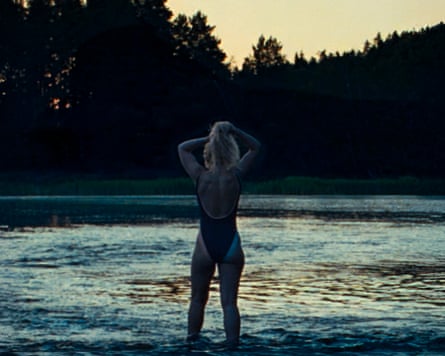If Donald Trump really wants to save Hollywood, maybe he needs to venture outside his comfort zone and watch more European art house cinema.
The Cannes film festival, which closes on Saturday, is in many ways the very definition of the “globalism” that the American president’s Maga movement despises. Walk past the queues snaking alongside the Palais des Festivals and you hear languages and accents from every corner of the globe. The Marché du Film, where industry professionals strike their deals, is brimming with smart people from all over the world beckoning US producers with irresistible tax incentives – resulting in the kind of movies “produced in foreign lands” that the US president earlier this month proposed punishing with 100% tariffs. At the opening gala, Cannes gave Trump arch-enemy Robert De Niro a platform to rally the world of cinema against the US president, “without violence, but with great passion and determination”.

But then you sit down in a dark screening room at the Palais, the piano strains of Camille Saint-Saëns’ Aquarius trickle over the Cannes trailer, and that distinction is not so clear any more. In French director Amélie Bonnin’s opening film Partir un Jour, driven-but-stressed celebrity chef Cécile is preparing for the opening of her new haute cuisine diner in Paris when news reaches her of the ill health of her father, who runs a run-of-the-mill roadside restaurant called Pit Stop out in the sticks. Cécile’s father ribs his daughter about her disdain for the unsophisticated palates of the “yokels”, but it’s apparent from the outset that the film’s sympathies lie a lorry-ride away from France’s cosmopolitan centre.
If at the heart of the culture war waged by Trump and his populist allies in Europe runs a divide between locally rooted “somewheres” and cosmopolitan “anywheres”, Partir un Jour is very much a “somewhere film”. It ultimately rejects shiso-flavoured lobster, roquefort panna cotta and Michelin stars in favour of boeuf bourguignon, hotdogs and Michelin tires. At Cannes, it turned out to be less of a duff note than the beginning of a theme.
Everywhere you looked, there were stories with a very specific sense of place: of people who are stuck in remote locations (Palme d’Or-buzzy The Sound of Falling by German newcomer Mascha Schilinski, Scottish auteur Lynne Ramsay’s Die, My Love) or return to them (French director’s Dominik Moll’s yellow-vests drama Dossier 137).
The thrill of big-city living was rarely glimpsed on any of the festival’s many screens. Turkish-German director Fatih Akin, who burst on the international scene 20 years ago with explosive urban drama Head-On, came to the Riviera with Amrum, a film set entirely on a remote North Sea island at the end of the second world war. Even Spanish director Oliver Laxe’s techno-infused mystery drama Sirât is not set in a Barcelona night club but a desert rave. The left-behinds? They were not so much ignored as put centre-stage and armed with automatic rifles in “elevated horror” director Ari Aster’s Eddington, a Covid satire so even-handed in its mockery of pandemic follies that it has earned criticism of striving for “Maga compatibility”.
A more lenient view would be that film-makers should have no truck with the binaries conjured up by politicians in the first place, because art at its best dissolves them anyway. Some of the most interesting films at Cannes were somewhere-anywhere films, rooted in a place but allowed to grow outwards. Finnish film-maker Lauri-Matti Parppei’s A Light That Never Goes Out, about a prodigy flautist who returns to his coastal family home after suffering a breakdown, sets out like Bonnin’s but turns a familiar plot on its head: in rural Rauma, protagonist Pauli finds meaning not in folksy simplicity but in joining an experimental noise-core band.
Akin’s Amrum prods the eternal German subject of Heimat (“homeland”) and comes up with unusual answers. What makes someone belong to Amrum, wonders the film’s child protagonist at one point. His schoolmates reckon it requires one to be born there, while his Nazi mother believes it runs in the blood. But the island’s oldest inhabitants tell him that’s all nonsense: real Amrumers, they reckon, are those who leave the island at the first opportunity.

“Anywhere” films at Cannes were few and far between, but it’s perhaps no coincidence that those that fit the tag were the ones with most box office potential: Christopher McQuarrie’s eighth instalment of the globe-racing Mission Impossible franchise, and Wes Anderson’s latest all-star ensemble piece The Phoenician Scheme, whose shady industrialist protagonist Zsa-Zsa Korda (Benicio del Toro) doesn’t even need a passport, because “I live anywhere”.
They are anywhere films in terms of their production: M:I 8’s big action set-pieces were filmed in London, Norway and thin air over South Africa, while The Phoenician Scheme is set in the fictional Middle Eastern-looking country of Phoenicia but was shot entirely in a studio in Babelsberg, outside Berlin, Germany. That may be expected of escapist films tilted at the box office, but also applied to two art-house productions with Hollywood involvement: Jennifer Lawrence-starring Die, My Love and Kristen Stewart’s directorial debut The Chronology of Water are set in Montana, California, Texas and Oregon – and filmed in Canada, Latvia and Malta.
These are clearly the kind of “movies made in foreign lands” that Trump wants to see the back of. Yet over the course of the festival the consensus gradually shifted to the assumption that tariffs won’t be the way it’s done, because it would be unworkable. As Anderson asked sarcastically when questioned about the presidential film tariffs: “Can you hold up the movie in customs?”
“Most people think it will just lead to the US copying the British model,” said Andreas Pense, a German lawyer who advises international film projects. The UK has by far been the most successful country in Europe at attracting American films, paying out £553m in tax relief to film companies in 2022-23. “But the US would have to cough up an insane amount of money, and getting that approved won’t be easy,” Pense added. “American productions are just more expensive.”

Some European countries with a presence at Cannes sounded surprisingly optimistic about standing their ground in a tax-incentive arms race with the US. Hungary, for example, does not just offer 30% in rebates to foreign producers making films in the central European state, but can also provide crews that are experienced and cheaper than those in the US, because unions pull much less weight in its cinematic sector than in the US. American productions being filmed outside Budapest this year include cold war spy drama Ponies, featuring Emilia Clarke and Haley Lu Richardson, and alien invasion comedy Alpha Gang, starring Cate Blanchett and Channing Tatum. Its trump card, Hungarian film professionals say, is that Budapest can impersonate anywhere in the world: Paris, Buenos Aires, Moscow, even London and New York. If you are making an anywhere film, what’s to stop you?
Perhaps the US president should take a leaf out of the rulebook of Dogme 95, the notorious Danish avant garde film-making movement. In Cannes, a group of Nordic five film-makers launched a reboot of the self-restricting school of cinema that brought forth Lars von Trier and Thomas Vinterberg. They retained only one rule from the original 1995 manifesto: “The film must be shot where the narrative takes place.”
A post on Truth Social, an executive order that binds all American directors to making American films set in America, and Hollywood’s problems would be solved in one stroke. Next up: work out whether anyone would still want to watch those films.

 3 months ago
160
3 months ago
160

















































